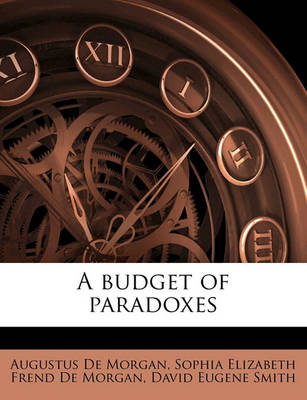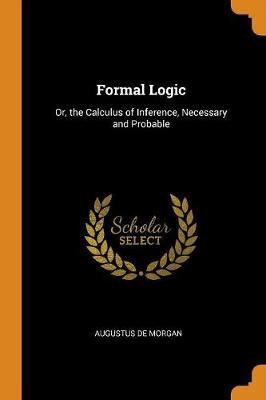Cambridge Library Collection - Mathematics
3 total works
A Budget of Paradoxes
by Augustus de Morgan, Sophia Elizabeth Frend De Morgan, and David Eugene Smith
Published 1 May 2003
An important figure in the development of modern mathematical logic and abstract algebra, Augustus De Morgan (1806-71) was also a witty writer who made a hobby of collecting evidence of paradoxical and illogical thinking from historical sources as well as contemporary pamphlets and periodicals. Based on articles that had appeared in The Athenaeum during his lifetime, this work was edited by his widow and published in book form in 1872. It parades all varieties of crackpot, from circle-squarers to inventors of perpetual motion machines, all for the reader's entertainment and education. Filled with anecdotes, personal opinions and 'squibs' of every kind, the book remains enjoyable reading for those who are amused rather than appalled by the human condition. Also reissued in the Cambridge Library Collection are the Memoir of Augustus De Morgan (1882), prepared by his wife, and his ambitious Formal Logic (1847).
From the end of antiquity to the middle of the nineteenth century it was generally believed that Aristotle had said all that there was to say concerning the rules of logic and inference. One of the ablest British mathematicians of his age, Augustus De Morgan (1806-71) played an important role in overturning that assumption with the publication of this book in 1847. He attempts to do several things with what we now see as varying degrees of success. The first is to treat logic as a branch of mathematics, more specifically as algebra. Here his contributions include his laws of complementation and the notion of a universe set. De Morgan also tries to tie together formal and probabilistic inference. Although he is never less than acute, the major advances in probability and statistics at the beginning of the twentieth century make this part of the book rather less prophetic.
Arithmetical Books from the Invention of Printing to the Present Time
by Augustus de Morgan
Published 16 May 2009
In the preface to this work, mathematician Augustus De Morgan (1806-71) claims that 'The most worthless book of a bygone day is a record worthy of preservation.' His purpose in writing this catalogue, published in 1847, was to provide an accurate record of the early history of publishing on arithmetic, but describing only those books which he had examined himself. He surveyed the library of the Royal Society, works in the British Museum, the wares of specialist booksellers, and the private collections of himself and his friends to compile a chronological list of books from 1491 to 1846 (the final book being a work of his own), giving bibliographical details, a description of the contents, and sometimes comments on the mathematics on display. De Morgan's Formal Logic and a Memoir of Augustus De Morgan by his widow are also reissued in the Cambridge Library Collection.


